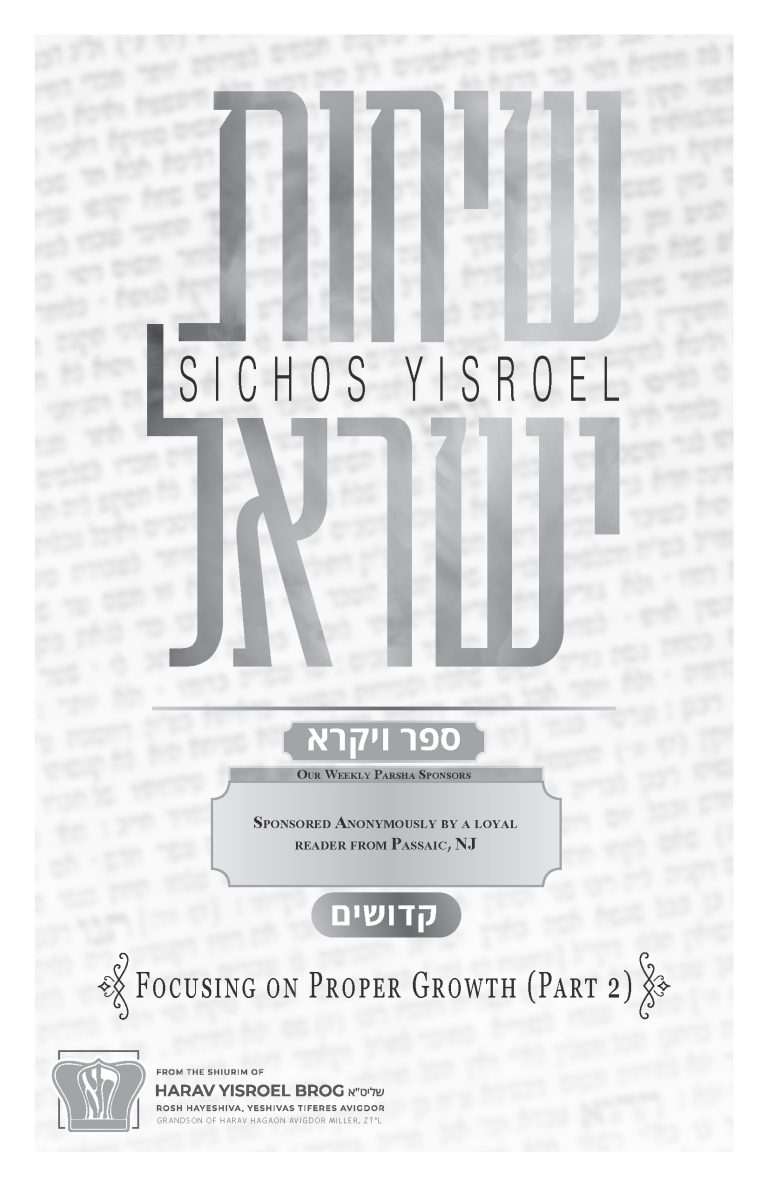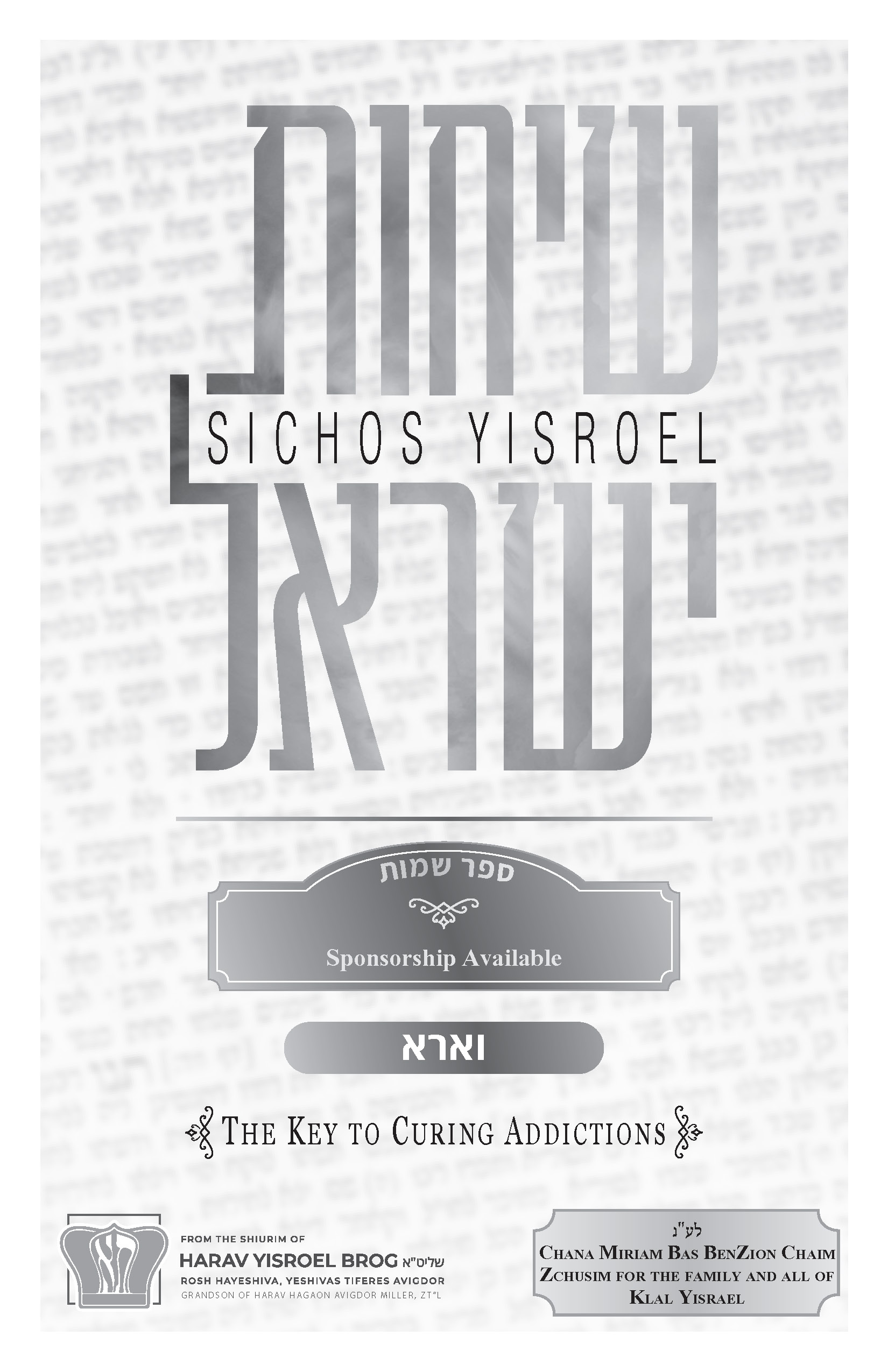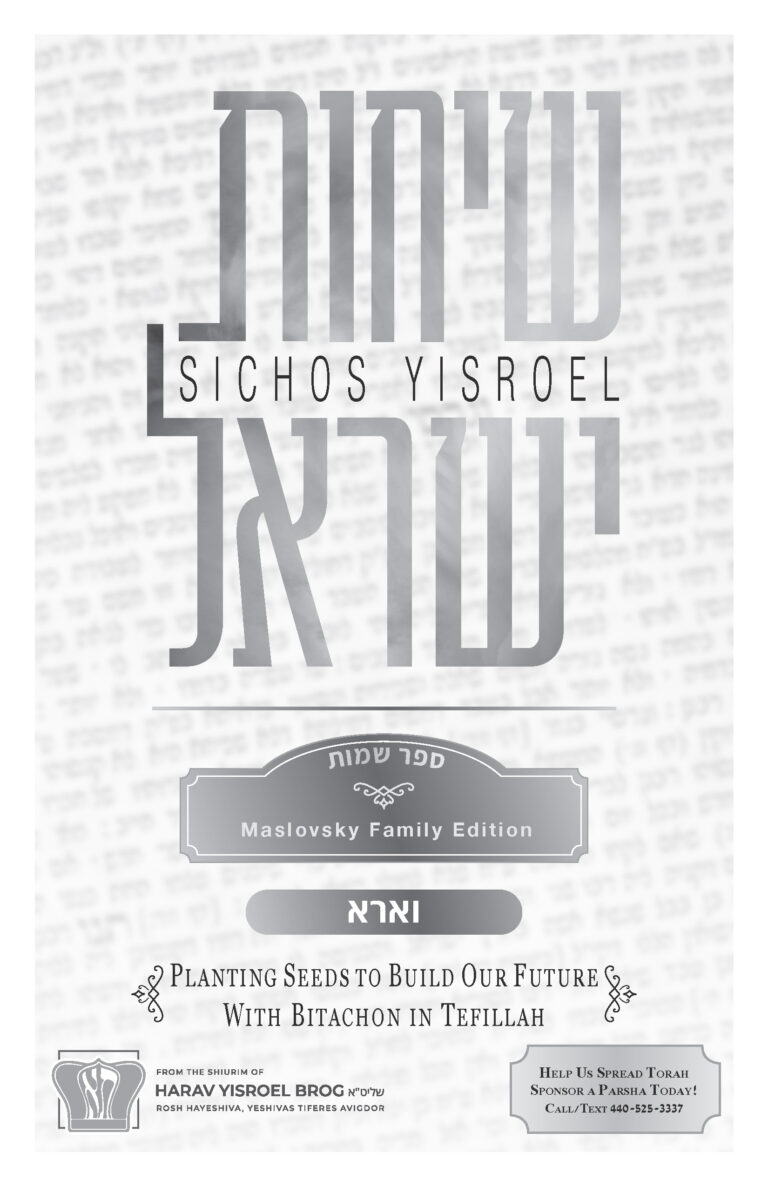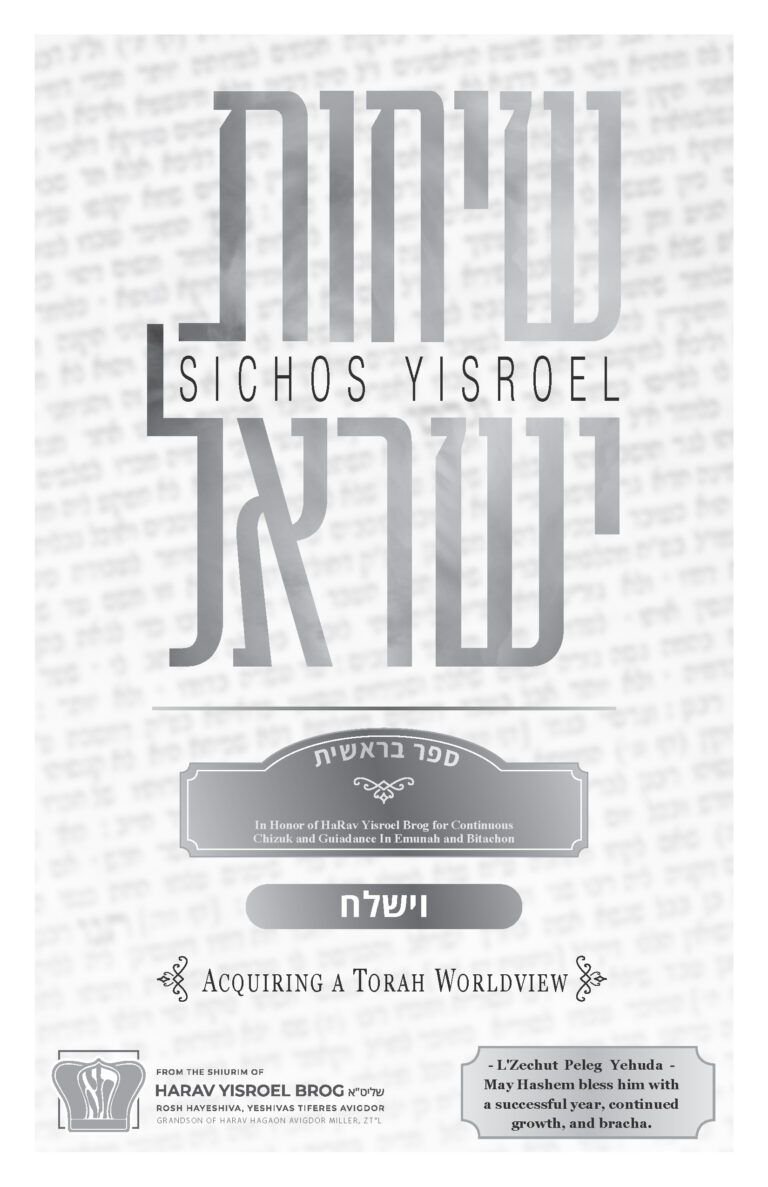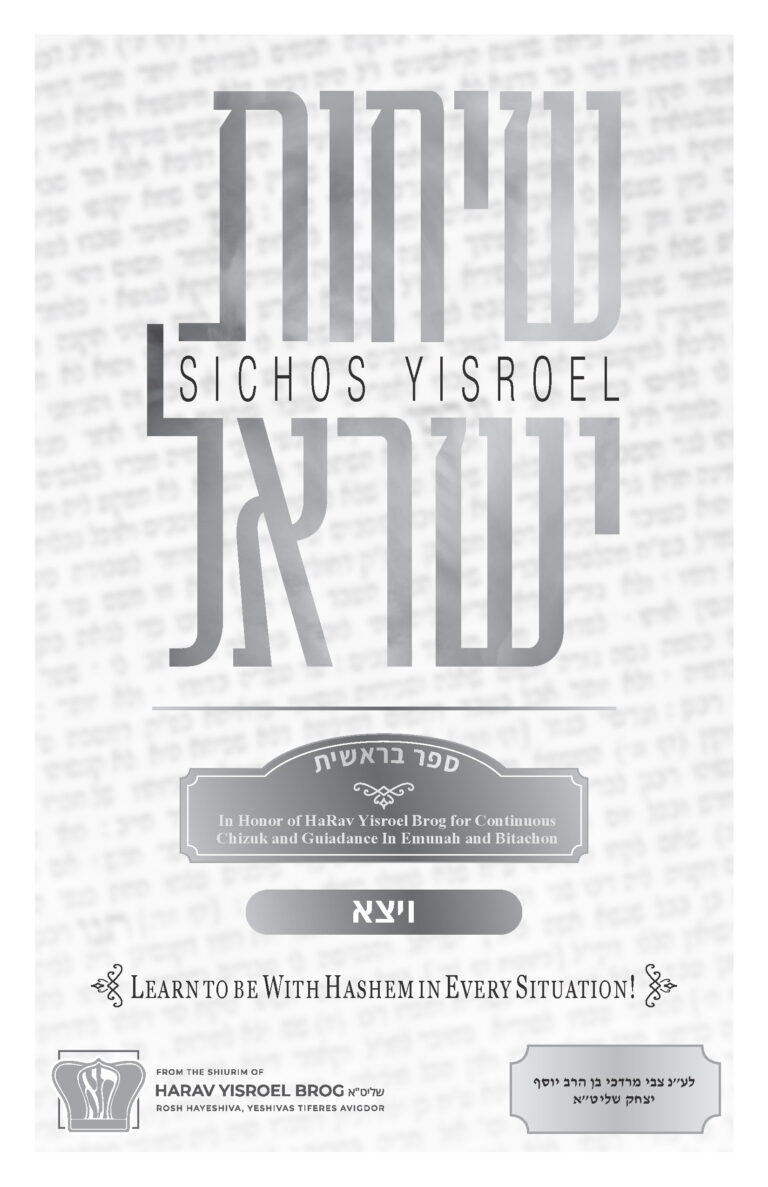Yisro 5783: Are You Aware That You Are Loved?
Sponsored
לע”נ ציריל פעסל בת ר’ צבי הלוי
Consider sponsoring a shiur
Visit YTATorah.org
Shiur presented in 5779
Did Hashem Love The Yidden, Or Hate The Mitzri’im?
The first passuk in this week’s parshah begins by telling us the following: וישמע יתרו כהן מדין חתן משה, Yisro (who was the priest of Midian, and the father-in-law of Moshe), heard, את כל אשר עשה אלקים למשה ולישראל עמו, everything that Hashem did for Moshe and for His Nation Israel כי הוציא ה’ את ישראל ממצרים, that Hashem had taken Bnei Yisrael out of Mitztrayim (Shemos 18:1). Rashi brings from the gemara in Zevachim מה שמועה שמע ובא, and he answers קריעת ים סוף ומלחמת עמלק. Yisro heard about Yitzias Mitzrayim and everything that transpired afterward, he was well aware of keriyas Yam Suf, and the milchamah against Amelek.
Later on, however, the passuk (ibid v. 8) states: ויספר משה לחתנו את כל אשר עשה ה’ לפרעה ולמצרים, Moshe told his father-in-law about all that Hashem had done to Pharaoh and Mitzrayim etc.
The question is, didn’t Yisro already hear about everything? He already heard about Yitzias Mitzrayim, keriyas Yam Suf, and milchemes Amelek. So what was Moshe Rabeinu mechadesh to him now?
I would like to share with you a beautiful pshat that gives us a tremendous insight about this event.
There was a famous gadol in Europe. His name was Rav Yechiel Michel Epstein (1829-1908), zt”l. He was the author of the Aruch Hashulchan. That sefer came out before the Mishnah Berurah. He was known in Europe as a rav’s rav. Everybody looked up to him. He was a gevaldige posek, and he brought together a lot of the halachos and clarified final shitos. He quotes a sefer called Ma’aseh Hashem (R’ Eliezer Ashkanazi, 1512-1585), who explains the following passuk in Tehillim, which says: ואתה ה’ מגן בעדי, and You Hashem are my shield, כבודי ומרים ראשי, my glory, Who holds my head high (Tehillim 3:4). Dovid Hamelech is expressing a hoda’ah to Hakadosh Baruch Hu for the fact that He saved him from all his enemies.[i]
Now, whenever you get saved from enemies there remains a doubt. There is a niggling doubt, “Why did Hashem save me from my enemies? Is it because Hashem loves me, or is it because Hashem hates my enemies?” Did Hashem hate Amalek or did He love the Jews? Hashem hates Amalek, that we know, מלחמה לה’ בעמלק מדר דר. Did Hashem like Pharaoh? I don’t think so. So what was the reason that the Yidden were saved in Mitzrayim?
There’s a big nafka mina whether Hashem saved you because He loves you or because He hates your enemies. What’s the nafka mina? If Hashem saved you because of His love for you, then it’s a great honor for you. Hashem is ohev tzaddikim – שומר ה’ את כל אוהביו, Hashem watches and guards all those who love Him. It’s a kavod for the person or for the group of people who receives that hatzalah. On the other hand, if the reason why Hashem saved you is because He does not like your enemies, then you don’t have what to pat yourself on the back for. It’s not a kavod for you.
Dovid Hamelech says, ואתה ה’ מגן בעדי, Hashem You were a shield for me. That means, “The salvation you brought to me was בעדי, it was for me and because You love me. And therefore, the passuk concludes כבודי ומרים ראשי, it serves as my kavod and it was an elevation for my rosh. But if the reason would have been because Hashem hated the enemies, Dovid Hamelech would not have had what to feel great about.
So, Yisro heard about all the wonderful things that Hakadosh Baruch Hu did, and he heard everything that Hashem did to Pharaoh in Mitzrayim. But Yisro had a safek. Vus shtait in this hatzalah? Is it because Hakadosh Baruch Hu loves Klal Yisrael? If so, in that case, it’s a gevaldige haramas rosh, it’s a gevaldige kavod for Klal Yisrael. But maybe the reason was because the Mitzri’im challenged Hashem – they defied and rebelled against Hashem – and that’s why Hashem took Klal Yisrael out.
Now, the emes is, do you know who else made this mistake? Pharaoh himself. Pharaoh himself told Moshe Rabeinu, “You don’t want to leave Mitzrayim. You know why? Because if you get away from us, ראו כי רעה נגד פניכם, you’re going to start to experience all kinds of ra’os. All kinds of evils will befall you.” Pharaoh said, “Don’t imagine that Hashem is providing you with all these yeshuos because Hashem loves you. It’s because Hashem does not like me. So as long as you’re around me, you have a chance, but if you leave Mitzrayim, ראו כי רעה נגד פניכם. You’re going to face evil.”
That is why after the cheit ha’eigel Moshe Rabeinu pleaded with Hashem not to destroy Klal Yisrael. Moshe Rabeinu said, “למה יאמרו מצרים, why should the Egyptians say, ברעה הוציאם להרג אותם, with evil intent did He deliver them, only to kill them in the desert (Shemos 32:12). Why would Moshe think the Mitzri’im would say, “Hashem took them out to kill them”?! It’s because that was the ta’anah of Pharaoh! Pharaoh was saying that Hashem hates the Jews too. They’ll get their turn. Wait until Hashem takes care of us Mitzri’im and then Hashem will ‘take care’ of the Jews. So Moshe Rabeinu davens to Hashem and says, “If You’re going to kill Klal Yisrael after the cheit haeigel, you’re going to validate the ta’anah of Pharaoh.”
Yisro was one of the advisors of Pharaoh until a certain point in time. He had already heard the inner chamber talk. Yisro wasn’t sure what the pshat was; was Pharaoh right or wrong about why Hashem took Klal Yisrael out of Mitzrayim with nissim? Was the pshat that Hashem didn’t like the Mitzri’im – and Yisro could understand very well why Hashem didn’t like the Mitzri’im? Or was it that Hashem loved the Jews?
Moshe’s Proof of Hashem’s Love: Hashem’s Continuous Salvations
So Moshe Rabeinu came along and said to Yisro, “Let me clarify something to you about everything you heard. You should know that I’m not introducing you to stories you never hear about. What I’m going to tell you is the reason that Hashem did it and I’m going to show you that Hashem did it because of His love for Klal Yisrael. And what’s the proof? The proof is because even after Hashem took them out of Mitzrayim, He continued to do gevaldige tovos for them. He gave them the man. He gave them the be’er. He provided them with food from shamayim and water from a rock. He gave them slav. He gave them and He gave them and He gave them.”
Now we can understand the following passuk: ויספר משה לחתנו, Moshe told his father-in-law, את כל אשר עשה ה’ לפרעה ולמצרים, everything that Hashem did to Pharaoh in Mitzrayim. What do the next words in the passuk say? על אודת ישראל, He did all of this for the sake of Klal Yisrael. Why? Because of His ahavah for Klal Yisrael. And what’s the ra’ayah (proof)to this? ‘את כל התלאה אשר מצאתם בדרך ויצלם ה, because even after they came out of Mitzrayim and they faced all kinds of challenges, with water, with food, with this and that, Hakadosh Baruch Hu saved them from those things also. That was the ra’ayah that Hashem did everything for us because of His ahavah! And how did Yisro respond to that? ויחד יתרו על כל הטובה אשר עשה ה’ לישראל, Yisro now rejoiced over all the tovah that Hashem did for Yisrael (ibid v. 9).
What was neschadesh for him now? He already knew everything that happened! What did Moshe Rabeinu tell Yisro that all of a sudden made him rejoice? The teretz is as follows. What was neschadesh to him, was את אשר עשה ה’ לישראל. That’s what he was nespael from. Hashem loves Klal Yisrael so much that Hashem demonstrated to them such a tremendous hatzalah from every type of situation. At first, Yisro was unsure whether the nissim were because of Hashem’s love of Klal Yisrael or because he hated the Mitzri’im and Amelek. But the fact that Hashem brought down the man and the be’er of Miriam, which were certainly because of the ahavas Hashem, forced Yisro to admit that the tremendous nitzachon was because of the ahavas Hashem to Klal Yisrael.
The Problem: Not Feeling Hashem’s Love
One of the great principles that we have to take out from here is the following. There is a tendency amongst people who aren’t happy to complain that they’re not loved. You see it in families. You have certain children who wake up after years and decide that they weren’t loved. A person called me up last week. He told me he’s having a difficult time. “I’m having a difficult time in my life now. I’m very challenged. I can’t get my act together.” I said, “I’m sure you saw a therapist. What did you conclude?” He said, “I was very abused when I was a child.” I said, “Really? What happened? What type of abuse did you suffer?” I said first, “Was it physical?” He said, “No. No physical abuse.” “Did your father ever lay a hand on you?” “No.” So it’s not physical. I said, “Was it emotional? Were you criticized? Were you put down?” He said, “No.” I said, “So how were you abused?” “I didn’t get the love that I needed.” I said, “That’s what you call abuse? Did your parents provide a home for you? Did they give you food? Did they give you clothing? Did they provide you with an education? Did they take you on trips and give you what everybody else had?” “It wasn’t enough,” he said.
People are like that, you should know. You’ll ask most people, “Do you feel love from your parents?” A lot of people don’t. You have to ask those people, “Do you feel that Hashem loves you?” Hakadosh Baruch Hu wants us to understand that He loves us. The ra’ayah is all the good things that he does for you. I tell this to people, “Hashem loves you so much.” You know what people answer me? “Well, He sure has a very funny way of showing it.”
I remember one of the first times I heard this from somebody. I said, “Do you have leukemia? Does your wife have leukemia? Are any of your children suffering from a debilitating illness?” “No.” I said, “How can you have a doubt that Hashem loves you? If Hashem didn’t love you, you wouldn’t be so blessed as you are now!” That person was such a complainer who thought that someone was out to harm him! If he were Hashem, he probably wouldn’t treat himself as nicely as Hashem is treating him.
A person has to know that Hakadosh Baruch Hu loves every person. There is a big yesod that can explain why people don’t understand that. Every one of us has within ourselves a challenge of atzvus (depression). Whenever you meet a person that has atzvus, where does that atzvus come from? I’m not talking about somebody who is not neurologically well. I’m talking about a person who is a normal person who feels now in a matzav of atzvus. Where does the atzvus come from?
Feeling Like You Lack Something
Rav Chaim Vital writes that all atzvus comes from a person feeling he lacks something. Let’s say a person is not healthy. Let’s say a person is not wealthy. Let’s say a person doesn’t have children and they want children. Let’s say a person doesn’t have a shidduch. Let’s say a person doesn’t own a home. Whenever I meet somebody who is b’atzvus, I first try to determine, “Is this a neurological condition or is it an emotional condition?” If I determine it’s emotional, I ask him the bingo question. “What are you missing in your life?” Because whenever a person exhibits that feeling, that’s what it means.
Now, not always is it correct. The avodas Hashem and the proper way to deal with this, is to acknowledge what you are missing in the wider picture of your whole life and everything you have. But the problem starts when people focus just on that. Tunnel vision. They don’t focus on what they do have. They focus on what they don’t have at the present moment. I have met people throughout my life who don’t have a good friend. They get very depressed because they don’t have a good friend. But you have a wife. They say, “It’s not the same.” So I agree. Maybe you’re missing something.
Most people are depressed over kinyanim in olam hazeh. That’s what they’re depressed about. Why is a person depressed? Because he doesn’t have what he thinks everybody else has.
There was a very nice person here this week whom I was very impressed with. She grew up in a family, where her father left work and went to sit and learn. He wanted to shteig ois, and he did. He had a nice-sized family. I was extremely impressed because this young lady said her family never went on vacations like others. She was in a very good school, but the families of the other students went to Florida. They went here. They went there. They went to Eretz Yisrael. She never got that opportunity. And she was not unhappy about it. It didn’t bother her. I was blown away because most people, given that situation, will feel deprived in their childhood. “Everybody else had. I didn’t have.” That causes people to have a certain sense of atzvus. She was not like that. I told her, “You’re an extremely fine and special person.” Very few people could live up to that and not feel jealous and not focus on their lack.
A person has to know that Hashem loves every single one of us. And if you can’t see how Hashem loves you, do you know what Hashem does for you sometimes? He reminds you how much He loves you, and how much he does for you. Suddenly you start to feel pain and you say, “Oy, oy.” You start to krechtz. Instead of thinking about, “You know how many millions of tovos Hashem does for me? Do you know what kind of recipient of brachah and hatzlachah and shefa I am?”
I met an older man. I said to the guy, “When was the last time you thanked Hashem that you’re married?” He said, “Oy a brach on my kup. What happiness? We’re now chasing each other to the hospital. I go to her doctors and she goes to my doctors.” I said, “You know why? I’ll tell you why. Because you never thanked Hashem for all the years you didn’t have to go to doctors. You always complained about your wife, did you not?” He said, “I found things to complain about.” I said, “Maybe it was a joke. Did you ever express to anybody or to Hashem, ‘I can’t thank You enough for being married?’”
The Solution: Continuously Counting Our Blessings
I remember when my zeida was 80 years old and he was thanking Hakadosh Baruch Hu for having a wife, for being married. He was describing the sense and the feeling and the brachah and the hashpa’ah and the tovah that he had. My bubba wasn’t a superwoman. She was a regular lady who had the regular ailments that most 80-year-olds have. But my zeida was ecstatic. When he was 90 he had to go through an operation which he didn’t want to go through. He did it for his wife. He said, “I’m doing it for her. She wants me to do it. She would have a hard time living without me.” Unbelievable!
Everyone has to count his blessings. You have to thank Hashem that you have children. Children aren’t good enough? You have healthy children? Thank Hashem for that. If you can’t delineate, if you can’t explain or articulate to somebody how much Hashem loves you and you don’t feel that love, that means that you are being a כופר בטובתו של הקב”ה.
Of course, at the end of Shemoneh Esrei we daven to Hashem and we ask Hashem for all kinds of brachos. We say to Hashem even if I’m not deserving, עשה למען שמך עשה למען ימינך עשה למען קדושתך, we say that. No question about it. We try to get ourselves any zechus that we can to get a leg up. And we daven to Hashem every Monday and Thursday Hakadosh Baruch Hu save us from the umos haolam that they shouldn’t say, למה יאמרו העמים איה נא אלקיהם.
Yetzias Mitzrayim: Feeling Hashem’s Love
A person has to know that you must think about Yetzias Mitzrayim. When you tell the story of Yetzias Mitzrayim to your children, it’s an opportunity to focus on Hashem’s love for us. You know how most people tell the story? In a very interesting way. I was thinking about this. When most people tell their children about the story of Mitzrayim, they say, “Hashem smashed the frogs over the guy’s head. Hashem did this. Hashem did that.” You tell the children about all the plagues that Hashem brought upon the Egyptians. But the biggest lesson is that Hashem didn’t do it to us at all! We were there too! We were on the same street, at the same place, at the same time. People drank from the same cup. The Mitzri’im suffered, but us Hashem saved. The ahavas Hashem was obvious in all that Hashem did for us.
You have to tell your children and tell yourself, “Hakadosh Baruch Hu, You took me out of Mitzrayim because You love me. You loved my forefathers. You loved Avraham, Yitzchak and Yaakov. You testify in the Torah that You loved them and that’s why You chose their children, out of love for our grandfathers and grandmothers.” A person has to feel that! A person has to acknowledge that and a person has to key into that. You must train yourself on a daily basis, not just to thank Hashem. Hoda’ah to Hashem is wonderful. But here, I’m talking about feeling Hashem’s love, because every one of us has so many ways in which they could and should notice the love that Hashem has for them.
Training Ourselves to Feel Hashem’s Love
The more I think about it, the more I get overwhelmed by how I hear of people who are getting to my age that are challenged with all kinds of challenges.
I met a friend of mine not long ago. He’s a couple of years older than me. I said, “You know when you get to this age and two chaveirim meet, the questions that you ask are different than what you used to ask ten years ago or twenty years ago.” Now you ask how is the blood pressure? How are the eyes? How is the hearing? Is the hearing still working? Arthritis? You have a hard time getting out of bed? That’s what you ask. You’re not saying, “Where are you going? What are you doing? How are things?” It’s a different story. The older you get, that’s what people ask you about. How are you getting around? Can you still climb the steps? You can’t climb the steps?
You don’t realize what is happening. Do you know what Hashem is telling you? Hashem is saying, “For years and years I demonstrated My love to you. I was meitiv with you even though you didn’t deserve it. You weren’t a super tzaddik and I gave you such tovos. You didn’t even feel that I loved you. You always complained you wanted more. It was never enough.” And if a person does that then the memory starts to go chas v’shalom. You can’t remember your wife’s name anymore.
Someone called me up recently. They were tzubrachen. They were crying on the phone to me. What’s the matter? “I went to my spouse and my spouse said, ‘Who are you?’ I said, ‘I’m your husband.’ ‘My husband? I don’t have a husband.’” That was the answer, nebach. You know what that is?
So the fact that you can remember your spouse and you can remember your talmidim, even the challenging ones, I’m thankful to Hashem for that. You have to be thankful to Hashem. But it’s more than that; you must walk around feeling that Hashem loves you.
I want to just show you how bad it is when you don’t feel Hashem’s love. Imagine you have parents. I’m sure you’ve heard about this. I’ve dealt with this many, many times in families. There are children and the parents really love the kids. They give them. They shower them. They say tattele, yingele, meidele, zeiskeit, munchkin, boompkin, whatever they call them. They really shower them with love. They do! And the kids act like little evil beasts. Instead of thanking their parents, it’s never enough. They have no respect for their parents. They don’t feel the love. They’re always complaining, “You didn’t do this for me. You didn’t do that for me.” You know what happens? These people walk around extremely bitter. This is what happens. How does that parent feel? The parent feels like the kid killed him! Like the kid is mamash rotzeach the parents. That’s how these parents feel. I know people like that in my life, who gave everything to their kids, והם פשעו בי, and they rebelled against their parents in the worst way.
Cases Where Parents Did Not Merit Their Kids’ Love
For a year, I used to go to a nearby nursing home. I would go every Friday. I wanted to remind myself of the chasdei Hashem and I wanted to see how old, rich people end their days. It was a nursing home for wealthy people, very exclusive. Their kids never came. It was such a rarity when kids came, it was unbelievable. I was thinking, “Did you help your kids?” They said, “I gave them everything. I did everything for my kids.” In the end, the parents were bitter. So why was it like that? You know why? Because they did it to Hashem. The parents did it to Hashem. They threw Hashem under the bus, even though Hashem did every single thing for them.
I’ll never forget. A mother once called me up. Her son invited her for Shabbos. She wasn’t frum. She came before Shabbos, and she wanted to leave on Shabbos. From a frum neighborhood. Her son told her, “Ma, you can’t leave on Shabbos. You have to stay another three hours. You can’t leave in the middle of Shabbos. You’re going to drive away and everybody is going to see. It’s Shabbos. It’s chillul Shabbos.”
The mother got furious at him. The mother was so furious she called me up after Shabbos. “Rabbi Brog,” she began, “I want to tell you about your student. He doesn’t honor his parents. Is that what you’re teaching him?” I said, “Tell me, what’s the story.” She tells me the story. I said, “Lady, do you really want the answer?” She said, “Do you have an answer for me?” I said, “Yeah.” I said, “That’s what he learned from you. I tell him he has to honor his parents but you got to him first. You told him, ‘Don’t honor your parents. Don’t honor Hashem.’ Do you know that Hashem said, ‘You’re not allowed to drive on Shabbos’? Did you ever hear about that?” “Yes.” “Did you hear that Hashem said you’re supposed to keep kosher?” “Yes.” “Do you do that?” “No.” “So you don’t listen to one thing Hashem tells you even though Hashem gives you so much stuff. Now you’re angry at your child because he’s not honoring you and giving into your will? You think you’re Hashem?!” I said, “I’m trying to brainwash your kid. I am attempting to wash your kid’s brains of all the folly and all the foolishness you taught him. You were a very poor example.” She said, “Oh that’s how you see it?” I said, “Do you see differently? Where am I going wrong?” She laughed at me.
Wanting to Reflect Hashem’s Love Back to Him
That’s what it is. Hashem loves each and every one of us, and you have to feel it and you have to express it. You know what happens when you love somebody? You want to pay that love back.
In your religious life, you shouldn’t have to struggle with learning. You shouldn’t have to struggle with davening. You shouldn’t have to struggle with mitzvos. Hashem is giving you a chance to do those mitzvos. Hashem is pouring His love on you. And appreciating that, makes you want to try to ‘pay it back’.
I can tell you one thing that’s guaranteed. When one thing goes wrong with you in your life, you’re going to come running and flying to Hashem. So why not come to Hashem when Hashem is in a loving mode, and pouring His tovah and shefah brachah on you?
Let’s always remember the degree to which Hashem loves us. And if we’ll remember that, then we’re going to be zocheh to more love and we won’t have to have ‘reminders’ and prompts to help us recall how much love Hashem has poured on us already.
[i] כתב ערוך השלחן בס’ קול בן לוי (דרוש ז’), וז”ל: בפרשה יתרו כתיב: ‘בחדש השלישי וגו’, כה תאמר לבית יעקב ותגד לבני ישראל, אתם ראיתם את אשר עשיתי למצרים ואשא אתכם על כנפי נשרים ואביא אתכם אלי, ועתה אם שמוע תשמעו בקולי ושמרתם את בריתי והייתם לי סגולה מכל העמים כי לי כל הארץ ואתם תהיו לי ממלכת כהנים וגוי קדוש אלה הדברים אשר תדבר אל בני ישראל.’ לבאר אלו הפסוקים נקדים מה שראיתי לבעל מעשי די (מעשה אבות פ”ו) שפירש בפסוקי ‘ואתה די מגן בעדי כבודי ומרים ראשי’ דדוד המע”ה כשנתן תודה לד’ על אשר הצילו מכל אויביו מ”מ נסתפק בסיבת ההצלה, אם מפני אהבת ד’ לדוד או מפני השנאה לאויביו, ויש הפרש רב בזה, דאם מפני אהבתו אזי כבוד הוא לו ויש לו במה להתפאר, ולא כן אם הסיבה הוא מפני שנאת האויבים. וזהו שאומר ‘ואתה די מגן בעדי’, כלומר אם מה שהצלתני מאויבי הוא מפני שאתה מגן בעדי שאתה אוהבי, זהו כבודי ומרים ראשי, ולא כן אם הסיבה מפני שנאת האויבים אין לי במה להתפאר. וע”פ זה יש לבאר מה הוסיף משה רבינו בסיפורו ליתרו יותר ממה ששמע בעצמו, כדכתיב ‘וישמע יתרו וגו’ את כל אשר עשה אלקים למשה ולישראל’ וגו’ ואח”כ כתיב ‘ויספר משה לחותנו את כל אשר עשה ד’ וגו’ ומה הוסיף לו. אמנם לפי מה שנתבאר הוסיף לו דבר גדול, דהנה יתרו שמע מה שעשה ד’ לפרעה ולמצרים אבל לא ידע הסיבה, אם מפני אהבתן של ישראל אם מפני שנאתו למצרים, שזה היתה טענת פרעה ‘ראו כי רעה נגד פניכם’, כלומר אל תדמו שעושה מאהבתכם, אלא מפני שינאתו לנו ולכן עושה לנו רעות, וכשתצאו יעשה גם לכם רעות, וזה הוא שטען משה רבינו בפרשה ויחל ‘למה יאמרו מצרים לאמר ברעה הוציאם להרוג אותם’ וגו’. וזהו שבירר משה ליתרו שכל זה אינו אלא מפני אהבתן של ישראל, וראיה ברורה לזה, שהרי אחרי הוציאם ממצרים נתן להם המן והבאר והשליו, וזהו דכתיב ‘ויספר משה לחותנו את כל אשר עשה ד׳ לפרעה ולמצרים – זהו – ‘על אודות ישראל’, כלומר מאהבתם של ישראל, וראיה שהרי ‘את כל התלאה אשר מצאתם בדרך ויצילם ד’, וכמו שבארנו. ולכן כתיב ‘ויחד יתרו על כל הטובה אשר עשה ד׳ לישראל’, כלומר שזה נתחדש אצלו, שכל מה שעשה ד’ יתברך, הכל בשביל אהבתו לישראל. ובזה יתבאר מאי דכתיב בפ’ לך לך אחרי שהכה אברהם את המלכים כתיבי ‘אחר הדברים האלה וגו’ אל תירא אברם אנכי מגן לך שכרך הרבה מאד’, דהנה אבינו הזקן אחרי שעשה לו הקב”ה נס גדול כזה להרוג ארבעה מלכים גדולים, נצטער משני הצדדין דאם הנס נעשה לו בשביל אהבתו ויש לו במה להתפאר, הא אמרו חז”ל (שבת לב.) כשעושין לאדם נס מנכין לו מזכיותיו, ואם הסיבה היתה מפני שנאת אויביו, הלא אין לו במה להתפאר. ולזה אמר לו ‘אנכי מגן לך’, כלומר כל מה שעשיתי מפני שאני מגן בעדך מאהבתך, ומ”מ אל תפחד שאנכה לך מזכיותיך, ‘שכרך הרבה מאד’ ולא אנכה לך. ולדעתי לכן על אברהם ודוד חותמין בברכה מגן אברהם מגן דוד, דמפני שאברהם ודוד היו להם שונאים רבים, אברהם מצד האמונה, שרדפו נמרוד וכל דורו כמ”ש הרמב”ם בספר המורה, ודוד מצד גודל המלחמות שהיה לו, והקב”ה גנן עליהם והצילם, לכן מודיע הקב”ה שהכל בשביל אהבתם ולא מפני השנאות שכנגדן, וזהו שאומרים מגן דוד מגן אברהם. וזהו שהקדים הקב”ה לצוות למשה שיאמר אל בני ישראל קודם קבלת התורה, ולהבינם איך שגדלה אהבת הקב”ה לישראל, וזהו שאומר ‘אתם ראיתם את אשר אשיתי למצרים’ וכולל בזה גם ראייה שכלית כמויי ‘ולבי ראה’ וגו’ (קהלת א טו), כלומר אתם תבינו את אשר עשיתי למצרים שזהו הכל בשביל אהבתכם. וראיה לזה שהרי ‘ואשא אתכם על כנפי נשרים’ כדאיתא במדרש שמרעמסס לסוכות יש קייכ מיל ובאו שמה ברגע אחת עד שהבצק לא החמיץ. ואומר עוד ‘ואביא אתכם אלי’, כלומר שכל כוונתי לרומם קרנכם ולהגביה מעלתכם עד שתבואו אלי, כלומר להיות מפמליא של מעלה הנכנסים לפני ולפנים. ואומר עוד ועתה אם שמוע וגו’ כלומר מעתה שתראו אהבתי לכם, נקל לכם להבין שרק ‘אם שמוע תשמעו בקולי ושמרתם את בריתי והייתם לי סגולה מכל העמים’ כלומר העם הנבחר. וזהו הקדמה לקבלת התורה דכל חביבותן הוא רק מפני התורה. ויש לכוין במאמר ‘ואביא אתכם אלי’ על דבר המחלוקת בין המקובלים לבין הפילוסופים, שאלו אומרים שהאדם גדול מהמלאך ואלו אומרים להיפך, ושניהם אמת, דוודאי מצד החומר במה נחשב הוא, האמנם אצילת נשמתו וודאי גבוה מגבוה. ובמתן תורה נתברר זה, שהרי אמרו חז”ל (שבת פח:-פט.) דהמלאכים בקשו את התורה, ומשה רבינו נצחם דלנגלות אין להם שייכות, ובזה גדולה מעלתם ממלאכי השרת, וזהו שאומר ‘ואביא אתכם אלי’ כלומר שהמלאכים אינם מפסיקים ביני לביניכם אלא אתם קרובים אלי יותר, וכו’.

